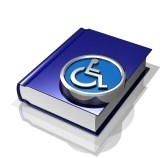by Jas Faulkner
 Lorraine* starts our interview by laying down a few ground rules. The first is that I am not allowed to describe her appearance or any other descriptors regarding her age, location, or level of ability. That last one might be a bit tricky, anyway. When I arrived almost an hour early at a local Starbucks to conduct the interview, she was already there. She game me a smile and a nod and asked for a moment to finish the email she was tapping out on her tablet as I sat down.
Lorraine* starts our interview by laying down a few ground rules. The first is that I am not allowed to describe her appearance or any other descriptors regarding her age, location, or level of ability. That last one might be a bit tricky, anyway. When I arrived almost an hour early at a local Starbucks to conduct the interview, she was already there. She game me a smile and a nod and asked for a moment to finish the email she was tapping out on her tablet as I sat down.
What I can reveal is what Lorraine does for a living. By day, or at least when she’s in her office, she is an advocate for special needs children and adults who are transitioning from the closed, protective environment of clinical settings to mainstream life. When she’s not there, she visits stores, libraries, entertainment venues, agency offices, and attractions to assess their user-friendliness for people who are mobility impaired. Most of this stealth work is done at the behest of the grassroots group she helps run to promote understanding and encourage more businesses to make their spaces handicap accessible: in this case, wheelchair and crutch-friendly. She grants that there are a few consulting firms who sometimes send her out as part of their control sample of customers to see how front-end personnel behave.
I’m almost afraid to ask her about book stores and libraries. The library in my suburb is fabulously accessible and even offers a pull service. Bookstores? They can be a mixed bag. Some limit shelf height and have nice, wide aisles. Others? Let’s just say that there are a few where I’m afraid taking a book off a shelf might trigger an avalanche that would take days and too many Metro Nashville Rescue personnel to uncover me. Lorraine agrees. And she gives my local library high marks and says Davidson county’s library system is one of the nicer ones she has visited.
“I’ll have to admit that there is a degree of ‘buyer beware’ mentality required to visit some book stores,” she said, “A smallish UBS in an older neighborhood or in a university setting is more likely to choose cleverness over efficiency. This is as true in larger cities like Nashville and Atlanta as it is the smaller town and gown type places like Bowling Green, Kentucky, where there is a degree of cultural divide between the people at the university and the locals.”
“So they’re thinking more about creating a place where you expect to see Boogums the Tome Goblin in a dark corner than aisles that are handicap accessible.”
Lorraine smiled and shook her head. “That’s an accurate description. Some of them are simply not built that way, and to demand that an already dark, tiny, antiquated space that is filled to bursting with books turn into a well-lit mart might be asking a bit much. It would be right from a legalistic standpoint. From a real world perspective, I have to weigh what I’m asking. If the space simply will not accommodate such changes, what are they willing to do to make the business work for someone who can’t get around their store?”
This does not mean that those charming jumbles of bookish lostness are run by people who don’t care or don’t have a Plan B ready when someone has difficulty negotiating the paths from Fiction to Travel to Folklore. In that respect, Lorraine had good news to share.
“I’ve yet to visit a shop where the person at the counter failed to offer to find what I want or get someone who bring a sample of what’s available on a given subject. At larger stores, both chains and used book stores, someone has offered to act as a concierge of sorts, either pulling books or walking with me to get books that might be difficult for me to reach otherwise. One store in East Tennessee told me they had other customers who had difficulty with the higher shelves. They had an arrangement where these people called a day ahead of time with a wish list of titles or interests and they were set up to browse at a sorting table. It’s not perfect, but people are trying.”
“Say I’m a store owner and I want to see how easy it is for someone with spina bifida or cerebral palsy to shop. What would you suggest?”
“It’s not rocket science. Rent a wheelchair and crutches for a day. You and your staff -if you have staff- pay a visit to the store from coming through the front door to browsing to trying to get your books on the counter to check out. That’s all there is to it,” she said, “I promise you, it will be educational.”
For more information on the legalities and some nuts and bolts tips on making your store accessible, visit these sites:
The ADA Small Business Primer: http://www.ada.gov/regs2010/smallbusiness/smallbusprimer2010.htm
How Can I Make My Business Disability Friendly? http://www.atnet.org/how-to/business-mods/retail-business-accessible.php
*Not her real name.
